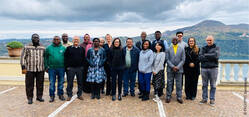Using the tools in Africa

The FAO/WHO Food Control System Assessment and the IPPC Phytosanitary Capacity Evaluation tools are being used in “Strengthening food control and phytosanitary capacities and governance,” a two-year project financed by the European Union and led by a team of experts from the FAO Food Systems and Food Safety Division (ESF) and the International Plant Protection Convention (IPPC) Secretariat. The project provides technical support and works with Competent Authorities and other leading institutions in 11 Common Market for Eastern and Southern Africa (COMESA) Member Countries to build up capabilities, strengthen governance and improve strategic planning around two main components: food safety and plant health. These two components are key in guaranteeing food safety.
Food safety is vital to prevent damage to food caused by biological, chemical, or physical hazards. Phytosanitary measures ensure that internationally traded agricultural products don’t spread pests which may damage crop production and the environment. Countries apply sanitary and phytosanitary measures to protect human and plant health.
The first step in securing food safety is to assess the country’s food safety and phytosanitary systems, their controls, and the processes currently in place. This helps identify their strengths and weaknesses and develop appropriate solutions to build capacities aligned with technical and international standards.
FAO is working with government agencies and other stakeholders in eight African countries to assess the processes and mechanisms used by the agencies in charge of food safety. The team uses the FAO/WHO Food Control System Assessment Tool, which is based on internationally recognized Codex guidance and is capable of assessing the national food control systems in a comprehensive manner.
As the custodian of the instrument, FAO HQ uses the feedback and data collected on the ground to further test and improve the tool.
As part of the project, government representatives and stakeholders in charge of food safety participate in workshops and trainings to engage in the participatory assessment process. Working together, they collect data, develop reports and hone in on the strengths and weaknesses of the system.
At the end of the project, the team will develop a strategic plan to refine the goals and implement solutions.
The project’s phytosanitary component involves running Phytosanitary Capacity Evaluations (PCEs) in nine African countries to fulfil international obligations, strengthen phytosanitary import and export regulatory systems and empower individuals and institutions. The process is driven by the National Plant Protection Organizations (NPPOs) and involves other relevant agencies and institutes. Facilitators trained by the IPPC Secretariat provide support to NPPOs in running PCEs.
A PCE consists of three so-called “consensus workshops” which involve strategic thinking at the policy, technical and managerial levels to reach an agreement among a group. They are meant to identify the priorities needed to fill capacity gaps and enhance the effectiveness of the overall phytosanitary system. Strategic plans developed through the PCE also include fundraising goals.
The IPPC designed PCEs to protect cultivated and wild plants by preventing the introduction and spread of pests. To learn more about the PCE follow this link.
Greater harmonization, better health, more progress
Both components use state-of-the-art instruments that have been widely tested and are based on internationally recognized measures and standards. The results of the assessments and evaluations are necessary steps for governments and stakeholders to provide safe food to their populations and to meet regional and international trade requirements, respectively with Codex and IPPC standards. Besides supporting greater harmonization at the regional level, the results of the assessments will allow countries to protect and improve public health and to gain competitiveness in regional and global food markets.
The project supports the EU programme with the African Union Commission aimed to strengthen sanitary and phytosanitary (SPS) capacities and governance at national, regional and continental level. Their collaboration is meant to enhance the newly established Africa Continental Free Trade Area (AfCTA), specifically working on the SPS measures that affect trade between AU Member States.
The World Trade Organization, through the Sanitary and Phytosanitary Standards (SPS) agreement, recognizes the IPPC standards as the means of globally harmonizing the phytosanitary measures and Codex Alimentarius as benchmarks for food safety.
Capacity development

The project contributes to developing national capacity, expanding the skills and the knowhow of the national workforce involved in food control and phytosanitary systems.
The tools and its introduction across different countries in the African Union offer an opportunity to develop a common vision among competent authorities and other stakeholders on the current status of the national food control and plant health systems.
The results of the assessments/evaluations will be used by ministries, main institutions and the private sector, adding to their knowledge and towards constant improvement of food safety and plant health.
